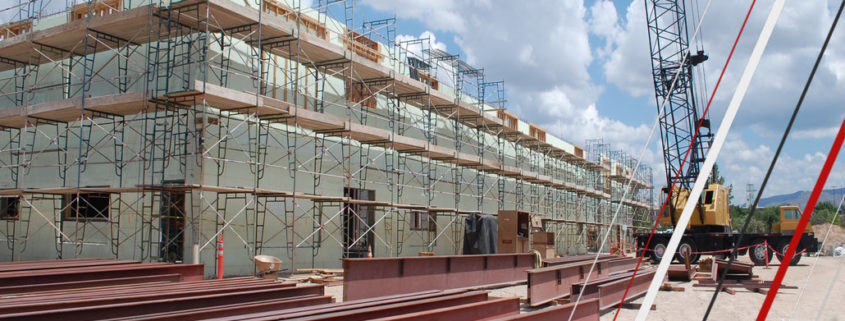The Government has confirmed it is banning the use of all combustible cladding on new residential buildings over 18m.
New building regulations will be introduced for external wall systems banning plastics, wood and other products that include combustible materials found in some aluminium composite panel systems.
Materials that would be allowed are those classed as A1 or A2 under the European Classification system.
Hotels and office building would be exempt because they have different evacuation strategies and the risks are lower.
Full details of the proposed ban have yet to be released. It is still not known whether the ban would apply to any material in wall construction from the internal face of the wall through to its external face, as first proposed.
If this proved the case internal wallpaper and paint, window frames, gaskets and seals, vapour membranes, surface finishes and laminated glass would likely be exempted.
To comply with the stricter requirements, it is estimated that for a 15-storey new build requiring 1,700m2 of cladding, a wall system which comprises only materials of A2 will cost an extra £25,000-£75,000.
Across England, this would equate to an expected overall annual cost of £7.5m-£11m assuming average build rates, according to the Government.
The Communities Secretary James Brokenshire confirmed the decision at the Conservative Party Conference.
“I can confirm that I will change the building regulations to ban the use of combustible materials for all new high rise residential buildings, hospitals, registered care homes and student accommodation.
“And bring about a change in culture on building safety.”
The new ban will be implemented through changes to building regulations to be brought forward in late autumn.
The plan to tighten up on materials use on building exteriors came as the Government also issued a further warning that even small amounts of combustible ACM cladding fitted to existing buildings must be removed.
Fresh guidance from the Government’s expert panel revealed that some experts were mistakenly advising building owners that combustible ACM cladding could remain on high rise buildings when fitted to small parts or strips of the building envelope.
The guidance says: “We have become aware that some building owners have received advice that indicates that it is acceptable to leave small or partial amounts of ACM cladding on their buildings.
“Given the risk of fire spread posed by ACM cladding systems, the independent expert advisory panel’s view is that leaving any amount of ACM cladding on a building would continue to pose a hazard to both residents and firefighters in the event of a fire.
“The clearest way to ensure the safety of residents is to remove all ACM, including small or partial areas of ACM, and replace it with a safe material. This remains the most appropriate remediation solution.”
However, the Fire Brigades Union (FBU) said the new regulations did not go far enough, claiming the move was “designed for political convenience”.
Class A2 materials such as plasterboard, which has limited combustibility, will continue to be permitted under the new rules.
Firefighters are calling for only A1 materials, which do not contribute to a fire at any stage – such as metal, stone and glass – be allowed.
The partial ban on combustible cladding will not be applied retrospectively to buildings that have already had the panels fitted.
FBU general secretary Matt Wrack said: “These measures do not deal with the existing cladding on nearly 500 buildings across England where people live and work every day.
“The government’s proposals only apply to buildings over 18 metres high, plus hospitals, care homes and student accommodation, when they should apply to all buildings, whatever their height or use.
“They continue to allow A2 materials, when they should permit only the highest standard of A1.”
Mr Wrack added: “This announcement is designed for political convenience, not for thoroughgoing change. The failings in the fire safety regime are far wider than just the materials used. The whole deregulated system and weak guidance needs to be overhauled.
“Many residents of high rise residential buildings and firefighters wanted more comprehensive action taken against flammable cladding. This government has failed to deliver.”
A spokesman for Mr Brokenshire said: “We are saddened to see the response of the Fire Brigades Union. We consulted on this very important matter and indeed went beyond what was asked of us.
“These measures will save lives, and we are clear building safety is at the very heart of what Mr Brokenshire is doing.”
Source: Construction Enquirer / The Independent





